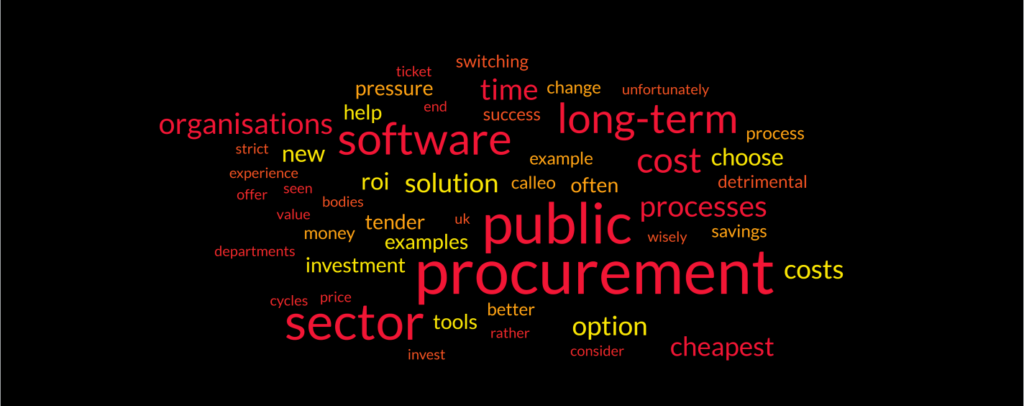Strict UK public sector procurement processes present a major challenge to public bodies, at least in the UK. These procurement processes have a legitimate and noble aim: using taxpayer money wisely. Unfortunately, the reality is far from ideal, with significant flaws that can make it difficult for public sector bodies to invest in long-term solutions.
My experience and expertise are in software testing and test tools. I’ve supplied best-in-class tools to many organisations, including the public sector, for decades. During this time, I’ve experienced quite odd behaviour and seemingly incomprehensible decisions when dealing with the public sector, all in the name of procedural compliance.
In this insight, I describe situations I have seen first-hand many times. I explore why the public sector continues to make these bad purchasing decisions and how this affects their ability to make effective long-term plans.
I’ll also explain how Calleo can help procurement departments deal with their challenges and make better informed decisions when acquiring software.
Of course, every procurement department has its way of doing things. However, the examples below represent typical and common behaviour in my experience.
UK Public Sector Procurement Pressures
The UK public sector provides essential services that require significant infrastructure and technology investment to drive efficiency and remain effective.
Strict procurement processes dictate how the public sector spends money on goods and services. These should ensure that public funds are allocated wisely, and contracts are awarded fairly and transparently.
Unfortunately, many procurement processes focus on cost rather than value. This makes it easy to ignore ROI, long-term benefits and the total cost of ownership.
3 Examples of Suboptimal UK Public Sector Procurement Processes
Working in public sector procurement must be incredibly challenging, particularly when planning for the long term. The examples below highlight issues with these processes rather than the procurement professionals doing their best to navigate them.
Example 1. The Belief That Cheapest is Best
I have seen many public bodies where the procurement process is hard-wired to choose the cheapest option, even when there were better long-term solutions that would deliver a better ROI and could be cheaper over time.
Typically, purchases are subject to a tender process involving multiple suppliers bidding for a contract. I once helped a county council with a tender process and identified the software that would meet their requirements and save them money versus their incumbent solution.
Ultimately, I was unsuccessful, and the contract was awarded to another supplier. Fair enough, it is a competitive market. I later found out that I lost the deal by only £50. This was annoying, and I admit to being rather peeved that I wasn’t invited to match or better their offer.
When I scratched deeper, it turned out that this council had bought from a software reseller with zero understanding of the software solution and couldn’t provide any aftercare service. For only £50 more, or letting me match the offer, they would have received a premium aftersales experience from a seasoned tools specialist, which is worth considerably more to them.
This is not (purely) sour grapes on my part – the value of an expert provider is worth significantly more than £50.
Example 2. Ignoring The Cost of Change
The public sector is often bound by cycles of 3 or 4 years. At the end of each cycle, they must go out to tender again for the same or similar product.
I have seen tender processes that ignore the often substantial cost of change and only consider the ticket price of the software.
Unfortunately, in the real world, moving to a new solution involves planning and rework just to tread water. This additional work will typically cost more than any savings and only gets you back to where you started.
Example 3. Failing to Consider The People Cost
I was once involved in a tender process and was demonstrating the time savings the organisation would make when using my recommended tool. I showed how this reduction in effort would mean they had more resources to distribute onto other tasks, or they could reduce headcount.
I was dumbfounded when told that people costs are not considered when selecting tools. I have since heard this many times from different public sector organisations.
Effectively, you can have two tools: one improves productivity, saves on people costs and generates an ROI. In contrast, the other tool has a cheaper ticket price but doesn’t offer long-term savings and benefits, and the latter tool wins.
The Need to Select the Cheapest Option Can Backfire
As you can see from my examples above, the pressure to choose the cheapest option can be detrimental in so many ways.
This approach often results in organisations switching to new software at the end of procurement cycles, with no appreciation of the knock-on effects or costs.
The pressure to choose the cheapest option can be detrimental to the long-term success of public sector organisations.
Procurement Don’t Always Factor in the Cost of Change
Switching to new software can significantly disrupt operations. Especially when your current solution is a better long-term option. This switch can lead to higher overall costs and reduced efficiency, negating the short-term (and short-sighted) cost savings.
Switching to new software always takes time, money, and resources… but those outlays are justified when moving to a solution with a genuine ROI. They are not justified when moving to a worse solution that will cost more, but the procurement department may feel pressured to change to the new solution based purely on the lower ticket price.
How Calleo Can Help with Software Investment
The pressure to choose the cheapest option can be detrimental to the long-term success of public sector organisations.
I’ve highlighted three examples where strict procurement processes made it impossible for organisations to invest for the long term. Furthermore, the pressure to choose the cheapest option can be detrimental to the long-term success of organisations.
At Calleo, we understand the time and resource challenges stakeholders and procurement departments face.
We know all parties want the right outcome but are often hamstrung by time and resource pressures.
However, public sector procurement departments do not have the time or bandwidth to invest time in researching and developing realistic business cases. This makes it impossible to understand the long-term ramifications of investment.
We Can Help You Work Out The True Cost of Software
To drive long-term success and value, these investments must be fully understood and made wisely and with a clear future vision – this is where Calleo can help.
We can work with you to develop a clear and detailed analysis of costs, impacts, and the return on investment (ROI) that you can expect from software.
This analysis will consider the short-term and long-term costs.
We will help you to understand the ROI and allow you to make a fully informed and cost-effective decision.
Finally, I want to stress that the above situations are based on my experience and are representative of many similar situations I have seen. However, these might not always happen with all organisations, so my apologies if this doesn’t apply to you.

















